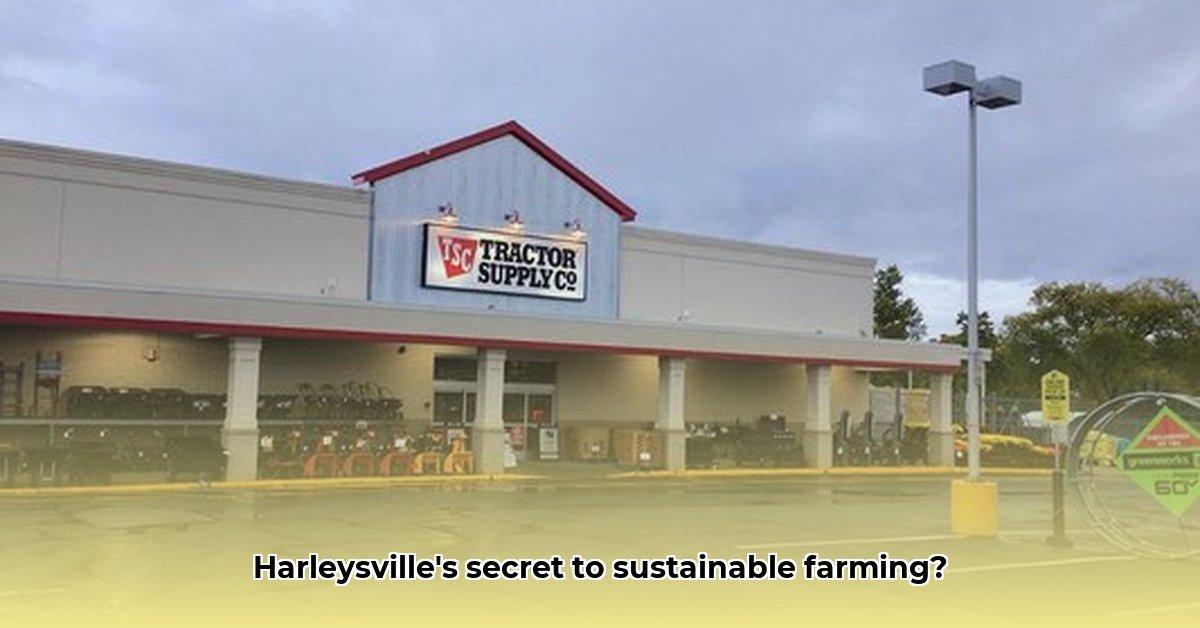
The sun rises over the rolling hills of Harleysville, Pennsylvania, casting a golden hue across the fields. Farmers, many of whom rely on their local Tractor Supply store, prepare for another day. But Tractor Supply's role in Harleysville's agricultural landscape extends beyond the familiar image of work boots and pet food. It plays a surprisingly significant, yet complex, part in the community's efforts toward sustainable farming. For comparison, see how another Pennsylvania Tractor Supply operates: [Kittanning Tractor Supply](https://tractor-supply-in-kittanning-pa.pages.dev). This article examines Tractor Supply's influence, highlighting both its contributions and areas for improvement, ultimately exploring how collaboration between the store, local farmers, and the broader community can foster a more environmentally responsible future.
Tractor Supply in Harleysville: A Closer Look
Tractor Supply in Harleysville serves as a crucial resource for local farmers, providing a wide array of agricultural necessities. From animal feed and fencing to seeds, fertilizers, and an extensive collection of tools, the store caters to both large farms and smaller, backyard gardening operations. But how effectively does this readily accessible supply chain support sustainable practices? This is the central question we explore.
Assessing the Current Offerings: A Mixed Bag
Tractor Supply stocks the basic tools and supplies needed for farming. However, a critical analysis reveals a need for greater transparency and a wider range of sustainably-focused options. While some products may support sustainable approaches (e.g., certain seed varieties), the lack of clear labeling regarding product origins and manufacturing processes creates challenges for farmers seeking to prioritize environmentally conscious choices. This lack of information hinders informed decision-making and limits the store's overall contribution to sustainable agriculture. Do their current offerings truly support the growing demand for organic and ethically sourced products? This is a question demanding further investigation.
Challenges and Opportunities: A Pathway to Improvement
Tractor Supply possesses significant potential to become a leader in promoting sustainable farming practices within Harleysville. Realizing this potential requires concerted effort across various fronts.
Enhanced Transparency: Detailed information about the sourcing and production methods of all products is crucial. Clear labeling that explicitly states the origin of materials empowers consumers to make informed decisions based on environmental impact. Knowing precisely what is being used is paramount for sustainable farming practices.
Dedicated Sustainable Product Lines: A dedicated section showcasing organic seeds, environmentally friendly fertilizers, and tools made from recycled or sustainably harvested materials would visibly demonstrate a commitment to eco-conscious choices. The increased visibility would make it considerably easier for customers to select sustainable options. This would be a significant step forward.
Strengthened Community Engagement: Collaborating with local farmers, agricultural organizations, and the wider Harleysville community is imperative. Hosting workshops on sustainable farming techniques, providing educational resources, and even demonstrating these practices in-store could make a significant difference. Interactive engagement is key.
Case Studies: Farmer Perspectives (To be added pending further investigation/interviews)
(This section will feature interviews with local Harleysville farmers, providing insights into their experiences using Tractor Supply's products and their own farming practices.)
A Collaborative Future: Toward a Greener Harleysville
The success of sustainable agriculture in Harleysville, and indeed any community, hinges on collaboration. Tractor Supply plays a vital role, but its impact is contingent on transparency, responsible consumer choices, and strong community partnerships. This requires a concerted effort from all stakeholders—the store itself, the farmers, and the broader Harleysville community.
Actionable Steps: A Roadmap for Sustainable Change
The following table outlines actionable steps for different stakeholders to contribute to a more sustainable agricultural ecosystem in Harleysville. These steps are designed to be both achievable and impactful over both the short and long term.
| Stakeholder | Short-Term Actions (0-1 year) | Long-Term Actions (3-5 years) |
|---|---|---|
| Tractor Supply | Conduct a complete sustainability audit of the supply chain; enhance product labels with origin details. | Develop a dedicated "Sustainable Farming" section stocked with verified organic and sustainable products; forge partnerships with eco-friendly manufacturers. |
| Local Farmers/Gardeners | Explore sustainable farming resources and certifications. | Advocate for policies supporting sustainable agriculture and local sourcing; actively share knowledge and best practices. |
| Harleysville Community | Promote awareness of sustainable agriculture; support nearby farmers' markets. | Establish community gardens; create educational programs focused on sustainable agriculture. |
| Local Government | Support sustainable agriculture initiatives; offer grants to local farmers. | Implement land-use policies that encourage sustainable agriculture and preserve natural resources; fund research and education. |
Understanding the Risks: Navigating Challenges and Opportunities
Successfully implementing sustainable agriculture practices involves understanding and mitigating potential challenges. The following table outlines key risks and suggested mitigation strategies.
| Risk Factor | Likelihood | Impact | Mitigation Strategy |
|---|---|---|---|
| Unsustainable product sourcing | Medium | High | Implement rigorous supply chain tracking; prioritize suppliers with clear sustainability commitments and certifications. |
| Lack of customer awareness | High | Medium | Employ educational programs and in-store marketing promoting sustainability options. |
| Competition from specialized stores | Medium | Medium | Focus on value-added services, community engagement, and personalized customer support. |
| Regulatory changes (environmental) | Low | High | Proactively monitor environmental regulations; strive to maintain compliance and relevant certifications. |
The journey towards sustainable agriculture is a continuous process of learning and adaptation. By acknowledging these challenges and proactively implementing effective mitigation strategies, Harleysville can build a more resilient and environmentally conscious agricultural future.
Key Takeaways:
- Tractor Supply's current offerings present a mixed bag regarding sustainability. While providing essential supplies, a lack of transparency and limited organic options hinder its full contribution to sustainable farming in Harleysville.
- Local initiatives, such as community gardens and educational programs, are crucial for complementing Tractor Supply's role, fostering a more effective approach to sustainable agriculture.
- Collaboration between Tractor Supply, local farmers, the wider community, and local government is crucial for establishing a truly sustainable agricultural ecosystem in Harleysville. This collaborative effort is essential for achieving long-term success.